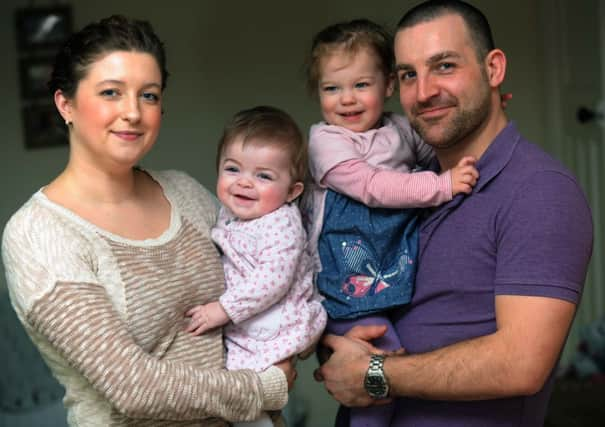Transplant hope for baby with genetic condition


The tot, from Ilkley, has MPS 1 Hurler syndrome which would halt her development, cause her to regress and cut her life expectancy to just 10 years old.
Next week Thea will undergo a bone marrow transplant – the only treatment for the syndrome.
Advertisement
Hide AdAdvertisement
Hide AdHer dad Richard said: “It is still a very risky option, however the alternative for us isn’t worth thinking about.
“Thea deserves every chance there is to lead as normal and as long a life as possible.”
She was born last July and was perfectly healthy.
However at a few months old, her family noticed a lump on her back and the GP told Thea’s mum Samantha that it could be a mild form of spina bifida.
They were referred to hospital but rather than wait several months, opted to go private and saw paediatric medicine consultant Dr Phil Chetcuti at the Nuffield Hospital in Leeds.
Advertisement
Hide AdAdvertisement
Hide AdRichard said they were very lucky to have seen Dr Chetcuti initially, who knew of the condition.
“About 90 per cent of children with MPS 1 are misdiagnosed between six and 10 times,” he said.
Richard and Samantha were devastated to be told that Thea had the condition – which neither of them knew they were carriers for.
“The probability of two people with it coming together and having a child must be one in a million,” he said.
Advertisement
Hide AdAdvertisement
Hide AdWith each child there is a one in four chance of them having the condition and their older daughter Ava, two, appears unaffected.
Thea is suffering from the initial signs of the syndrome, a curvature of the spine and an enlarged forehead.
She is expected to develop normally until the age of three, but left untreated the syndrome would cause her to then lose the abilities she had picked up, including walking and talking.
The youngster’s mental capacity would be affected causing symptoms similar to dementia and her life expectancy would be severely curtailed.
Advertisement
Hide AdAdvertisement
Hide Ad“Getting her diagnosis was the worst day of my life,” her dad, 31, said.
“We were expecting to be told she had a damaged spine and she was going to need surgery.
“The prognosis of MPS 1 children is that they generally don’t live past the age of five, or maybe to 10.
“You feel like your whole world just falls apart.”
Thea was immediately referred to Manchester Royal Children’s Hospital, where the world-leading specialists in the condition are based.
Advertisement
Hide AdAdvertisement
Hide AdThere she has been undergoing NHS-funded Enzyme Replacement Therapy, to replace the enzyme which she is missing and which causes the syndrome.
But this weekend she is due to be admitted to undergo chemotherapy and then a bone marrow transplant, which will use donated umbilical cord blood.
“We have been given an amazing amount of hope by the guys in Manchester,” Richard, general manager of the Crescent Inn in Ilkley, added.
“They said that because it was diagnosed so young, the bone marrow transplant will have a greater effect.”
Advertisement
Hide AdAdvertisement
Hide AdThe treatment will be gruelling, but the hope is that the transplant will be a success and enable Thea to start producing the missing enzyme herself.
“How her body responds depends on how much enzyme is released and how the donor blood can function.
“If it does well,it could extend her to a relatively normal life expectancy, but they don’t know because it’s different for every child.”
Thea’s family are seting up a trust to help with costs of caring for her and are also supporting charity MPS Society, which is holding an awareness day on May 15.
Anyone who can help with fundraising should contact [email protected].